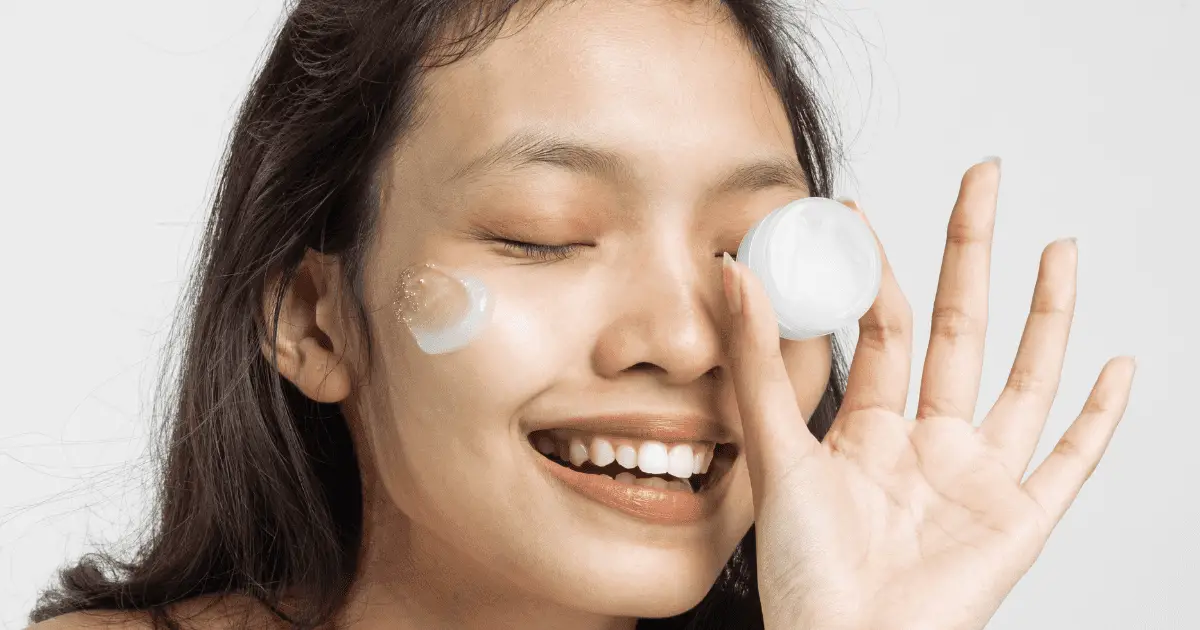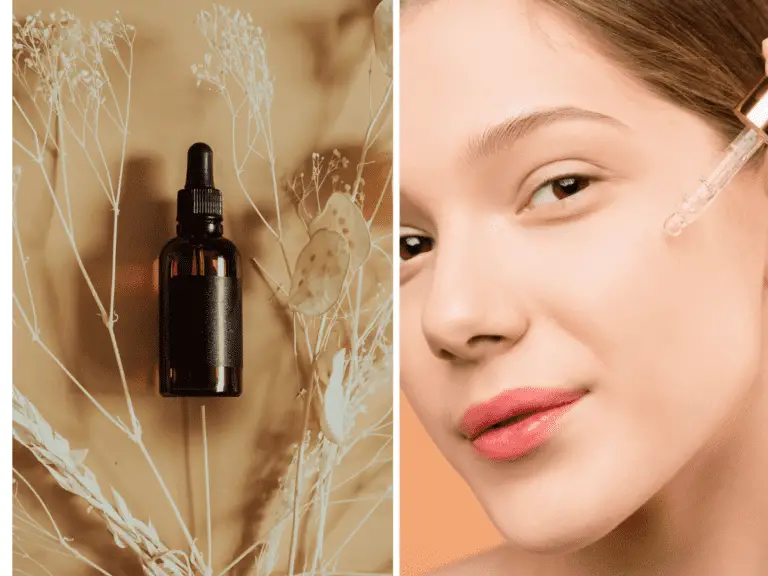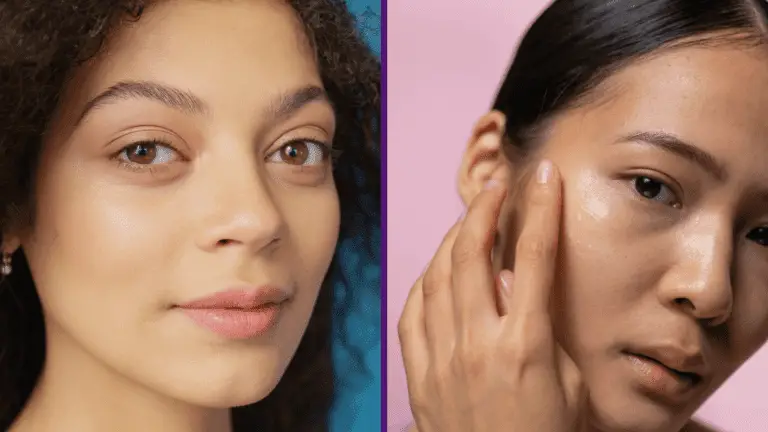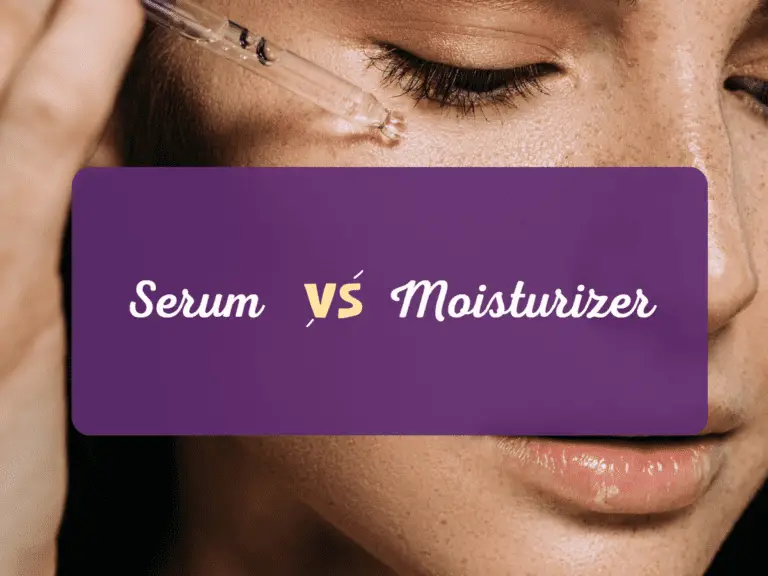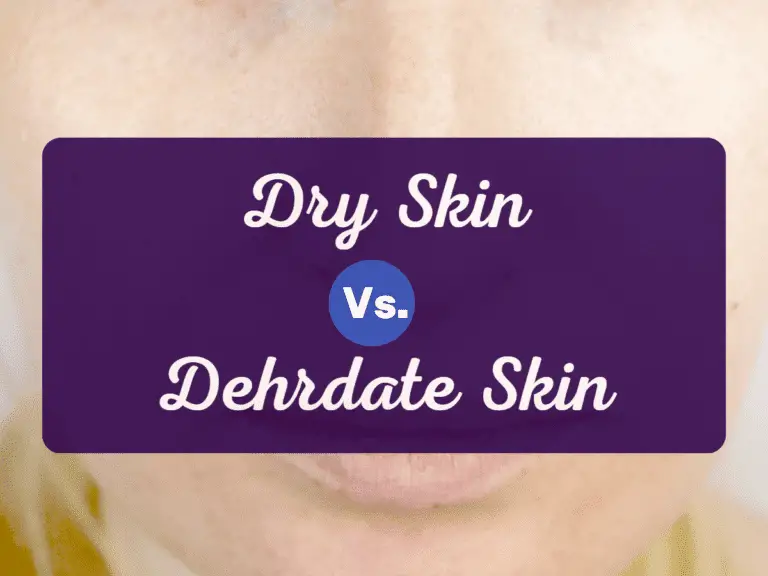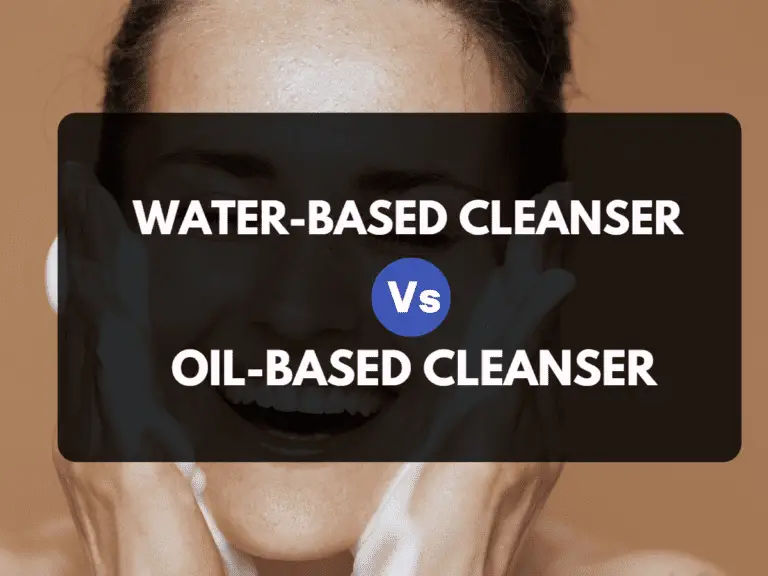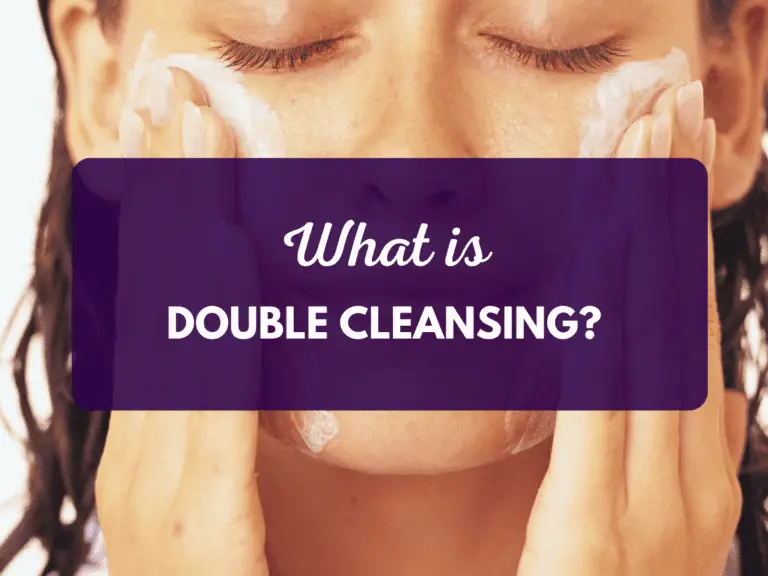If you’ve ever wondered whether your skin needs a moisturizer, you’re not alone.
Many people are unsure whether they should use a moisturizer and, if so, which one is right for them.
In this article, we’ll take a closer look at the benefits of moisturizers and help you decide if one is right for you.
Let’s dive right in!
What is a moisturizer?
A moisturizer is a skin care product that hydrates and retains moisture from your skin barrier.
It is important to moisturize your skin daily, especially if you have dry skin. Moisturizers can be applied to the face and body.
They come in different forms, such as lotions, creams, gels, and oils.
What do moisturizers contain?
Moisturizers are essential to any skincare routine, but have you ever wondered what they actually contain?
Here are the different types of ingredients found in moisturizers and what they do for your skin.
Humectants are one of the key ingredients in moisturizers. They help to attract and retain water in the skin, keeping it hydrated. There are different types of humectants, each with its own unique properties.
Glycerin is a common type of humectant. It’s derived from natural fats and oils, making it gentle and non-irritating on the skin.
Hyaluronic acid is another popular type of humectant as it can hold up to 1,000 times its weight in water. It makes hyaluronic acid highly effective at hydrating the skin. Other types of humectants include urea, propylene glycol, and sodium PCA.
Another type of moisturizing ingredient is an emollient. Emollients soften and smooth your skin by filling spaces between the cells. They can be derived from natural sources, like plant oils or synthetic materials.
Occlusives are one type of moisturizing ingredient. They seal moisture in your which prevents your skin from dehydration. It keeps your skin soft and hydrated for a longer time. Petrolatum and mineral oil are two common occlusive ingredients found in moisturizers.

What are the benefits of using a facial moisturizer?
There are many benefits of using a moisturizer, including:
- Prevents dry skin: Dry skin is more prone to wrinkles, fine lines, and other signs of aging. Moisturizing helps to keep skin hydrated and looking young and fresh.
- Reduces the appearance of wrinkles: When applied to the face, moisturizers can help reduce the appearance of wrinkles and fine lines by trapping moisture in the skin.
- Provides a barrier against environmental damage: protects the skin against damage from wind, cold, weather, and pollution.
- Prevents acne: Acne is caused by a build-up of oil and dead skin cells. Moisturizing helps to keep pores clear and reduces the likelihood of breakouts.
- Sun protection: Sun damage is one of the leading causes of premature aging. Moisturizers that contain SPF can help protect your skin from harmful UV rays.
- Soothes sensitive skin: Using a moisturizer can also help reduce irritation and redness for dry or sensitive skin.
Moisturizers can be used on both the face and body to hydrate the skin and keep it looking healthy.
How do moisturizers work?
Dry skin can feel tight, rough, and itchy. You may even see flaking or redness. Using a moisturizer can help to soothe and protect your skin. But how do moisturizers work?
Moisturizers work by providing enough moisture and water content to the skin from the outside. This helps to increase your skin’s water content and improve hydration.
Humectants, like glycerin, attract water to the top layer of your skin. Occlusives, like petroleum jelly, create a barrier that prevents water from leaving your skin.
In addition, some moisturizers contain ingredients that help to repair the skin barrier and reduce inflammation.
When selecting a moisturizer, choosing one that is appropriate for your skin type is important.
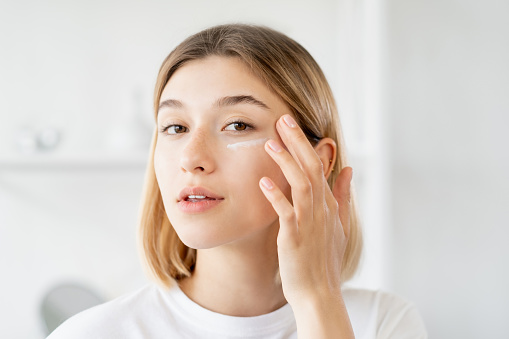
How to choose the right facial moisturizer?
While finding the best face moisturizer all starts with knowing your skin type.
Do you have normal, dry, oily, combination, sensitive, or acne-prone skin?
Once you know your skin type, find out which face moisturizer will work best for you.
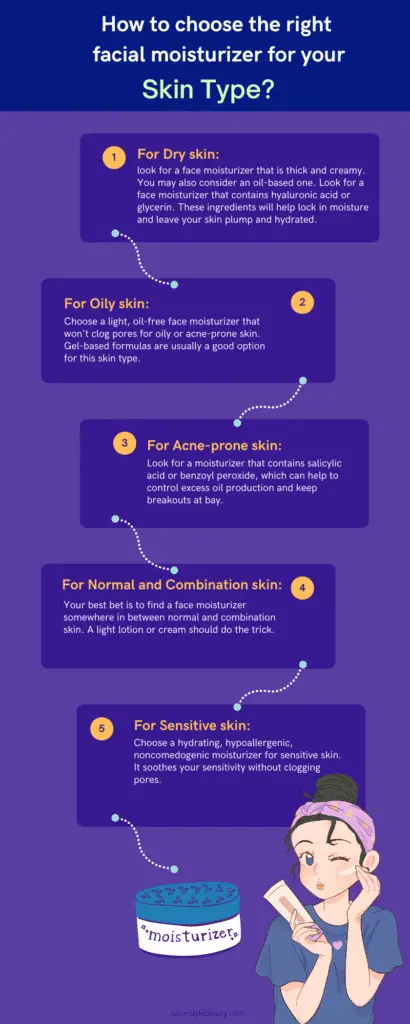
Dry skin: look for a face moisturizer that is thick and creamy. You might also want to consider an oil-based one. Look for a face moisturizer that contains hyaluronic acid or glycerin. These ingredients will help lock in moisture and leave your skin plump and hydrated.
Oily skin: Choose a light, oil-free face moisturizer that won’t clog pores for oily or acne-prone skin. Gel-based formulas are usually a good option for this skin type.
Acne-prone skin: Look for a moisturizer that contains salicylic acid or benzoyl peroxide, which can help to control excess oil production and keep breakouts at bay.
Normal and Combination skin: Your best bet is to find a face moisturizer somewhere in between normal and combination skin. A light lotion or cream should do the trick.
Sensitive skin: Choose a hydrating, hypoallergenic, noncomedogenic moisturizer for sensitive skin. It soothes your sensitivity without clogging pores.
Are moisturizers good for oily skin?
It’s a common myth that oily skin people shouldn’t use moisturizer. Oily skin is often a source of frustration for those who have it.
You may feel like you don’t need to moisturize because your skin is already producing enough oil. In reality, even if your skin is on the oilier side, you still need to hydrate it.
While you may not need a heavy, greasy moisturizer, you should still look for one that is oil-free and non-comedogenic. It’ll help keep your skin hydrated without adding extra oil.
The key is to find a facial moisturizer that won’t clog your pores or make your skin feel greasy.
Always look for a few things when choosing a facial moisturizer if you have oily skin:
- First, make sure it’s non-comedogenic, meaning it won’t clog your pores.
- Second, look for one that’s oil-free and gel-based, as these formulas are typically lighter than cream-based moisturizers.
- Third, consider one with mattifying properties to help control shine throughout the day.
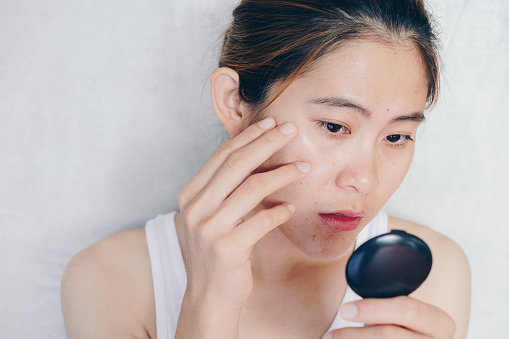
Once you’ve found a facial moisturizer that works for you, apply it every morning after cleansing your face.
In addition to using a moisturizer, you must also cleanse your face twice daily and use a sheet mask or clay face mask once a week. Following simple tips, you can control your oily skin and keep it looking healthy and radiant.
What happens when you stop using Moisturiser?
If you’re thinking about giving your moisturizer a break, you may wonder what will happen to your skin. Will it become dry and flaky? Will it start to look dull?
First, your skin may go through a temporary adjustment period. This is because your skin is used to being hydrated and needs time to adjust to not having that extra moisture.
If you have normal skin, you may feel that your skin feels dryer than usual after a few days.
However, remember that this is not permanent and that your skin will eventually adjust.
But, if you have dry skin, stopping moisturizer can cause your skin to become flaky, itchy, and cracked. Your skin may also become more susceptible to infection. If you have oily skin, stopping moisturizer can cause your skin to produce even more oil, leading to breakouts.
So, is it important to use a moisturizer daily for all skin types?
Yes, no matter what your skin type is, you should use moisturizer as per your skin type and concern daily.
How often should you moisturize your skin?
When it comes to using moisturizer, there is generally accepted advice that most dermatologists and skincare experts will agree on: applying it twice daily, every morning, and every night.
This simple skincare step is crucial in maintaining healthy and hydrated skin.
Can moisturizers cause acne?
There is no indisputable answer to this question, as everyone’s skin reacts differently to different products.
However, some people find that their acne gets worse when they use moisturizers, so it is possible that they can cause breakouts.
Here’s the thing: your skin needs moisture to stay healthy. That’s why using a good face moisturizer is important to any skincare routine. But here’s the key – you have to find the right balance.
If you use too heavy or oily moisturizer, it can clog your pores and lead to breakouts.
Suppose you use a moisturizer and notice that your acne is getting worse. In that case, you may want to try a different product or consult a dermatologist to see if there is another underlying cause.

So how do you know if you are over-moisturizing?
If your skin is telling you it’s time to cut back on the moisturizer, listen!
Some key signs indicate you may be over-moisturizing.
Take a look at the texture of your skin. If it’s feeling excessively oily or greasy, that’s a good indicator that you’re using too much moisturizer.
Another telltale sign is if you’re constantly dealing with clogged pores and breakouts. When your pores are overloaded with product, they can become clogged, leading to blemishes.
If you see any of these changes in your skin, it’s time to cut back on the moisturizer. You may even consider switching to a lighter formula or using it less often.
Is it bad to wear moisturizer at night?
If you have never used a moisturizer at night, you may wonder if it is bad for your skin. The answer is no – you should not skip moisturizer at night. However, suppose you use any facial oils, sleep masks, or cream with moisturizing ingredients at night. In that case, you can skip the additional step of applying a separate moisturizer.
Is wearing an SPF moisturizer at night bad for the skin?
Dr. Tanisha Aggarwal, a certified Dermatologist from the All India Institute of Medical Sciences (AIIMS), recommends using a simple, non-SPF moisturizer at night and reserving products with SPF for daytime use.
“Applying a moisturizer with SPF at night might not hurt you. Still, it’s not the best thing for your skin,” according to Dr. Tanisha Aggarwal.

Dr. Rakesh Jhaa, a skincare expert at Beauty Pal, says that wearing SPF moisturizer at night may cause more harm to your skin. “The skin repairs itself during the night, and SPF creams also lack the required moisture your skin needs during this time,” he explains. “Using an SPF cream at night can disrupt the skin’s natural repair process.” It’s best to apply a normal moisturizer or a night cream instead of an SPF moisturizer at night.

Can you use sunscreen as a moisturizer?
Yes, you can use sunscreen as a moisturizer if your sunscreen contains enough moisturizing ingredients that will work for your skin type.
Using sunscreen as a moisturizer can be a great way to get an all-in-one product that will protect your skin from sun rays and keep it hydrated.
When choosing a sunscreen to use as a moisturizer, read the label carefully to ensure it contains appropriate ingredients for your skin type.
For dry skin, look for a sunscreen that contains hyaluronic acid or glycerin, which will help lock moisture in the skin. For oily skin, look for a sunscreen that is oil-free and non-comedogenic so it won’t clog your pores.
Do you need a day and a night moisturizer or cream?
It depends on your skin type and concerns.
For normal or combination skin types, you can probably get away with using a single moisturizer for both day and night.
However, suppose your skin is more on the drier side. In that case, you might want to consider using a separate moisturizer for day and night.
Night time is when your skin repairs, so a heavier, more nourishing moisturizer can be beneficial.
During the day, on the other hand, you’ll want to use a lighter formula that won’t clog pores or interfere with makeup.
However, your skin may also benefit from using a different moisturizer day and night.
A daytime moisturizer may be lighter in texture, and a few moisturizers provide SPF protection. A nighttime moisturizer can be richer and help repair the skin overnight.
Now, it’s important to listen to your skin and see what works best for you. If unsure, consult a dermatologist or skincare professional to get personalized advice.
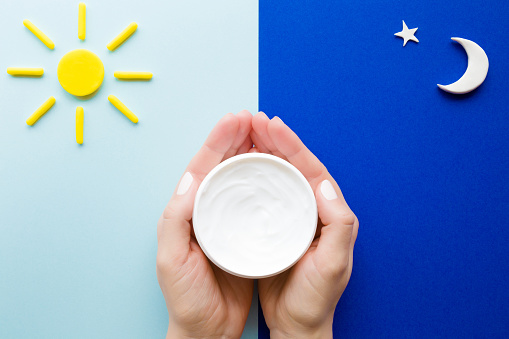
Should you apply moisturizer after washing your face?
It’s a common question with no straightforward answer: should you apply moisturizer after washing your face?
There are conflicting opinions on it. According to one school of thought, you must apply moisturizer immediately after washing your face while your skin is still damp. The logic behind it is that it helps to lock in moisture.
Another school of thought is that you should wait a few minutes after washing your face before applying moisturizer so that your skin has a chance to absorb any active ingredients in your cleanser.
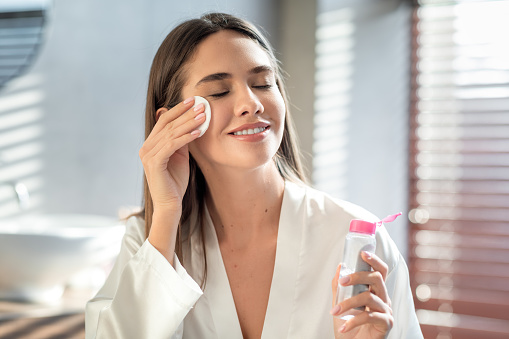
So, which is the right approach?
The best way is to experiment with methods and see what gives you the best results. Start by trying both methods and see which one leaves your skin feeling softer and more hydrated.
Remember, if you’re using a cleanser with active ingredients like retinol or glycolic acid, it’s generally recommended to wait 20-30 minutes before applying moisturizer. This gives the product time to work its magic without being diluted by moisture.
How to apply a moisturizer?
Applying a moisturizer is important for keeping your skin healthy and hydrated.
But did you know that there is a right way to apply it?
After washing your face, always use upward strokes when applying your moisturizer around the face and eye contour.
By using strokes upward, you are helping to keep your skin looking young and fresh. So next time you reach for your moisturizer, remember to go against gravity!
How to apply a moisturizer?
So, is moisturizers worth it?
Yes, moisturizers are necessary for all skin types, even oily skin. The key is to find the right moisturizer for your skin type. Moisturizers help keep the skin hydrated, protect the skin from environmental damage, and even help reduce the appearance of fine lines and wrinkles.
FREQUENTLY ASKED QUESTIONS
Does moisturizer clog pores?
It’s a question that has long been debated in the beauty world: does moisturizer clog pores?
The answer depends on the type of moisturizer you use. If you choose a heavy, oil-based moisturizer, it is more likely to clog your pores. However, there are light, water-based moisturizers that will not clog your pores.
If you are concerned about clogged pores, talk to your dermatologist about the best type of moisturizer for your skin type. In general, avoiding heavy, oil-based products is best if you are prone to breakouts.
Are moisturizers bad for acne?
There is no evidence that moisturizers are bad for acne. In fact, some studies suggest that moisturizers may help to treat acne by keeping the skin hydrated and preventing dryness, which can lead to irritation.
However, choosing a non-comedogenic (non-pore-clogging) moisturizer suitable for your skin type is important, as some moisturizers may actually worsen acne.
How do tinted moisturizers work?
Tinted moisturizers are a type of makeup product that combines the benefits of skincare and cosmetics.
They are applied like regular moisturizers but contain pigments that can even out skin tone and provide coverage similar to a foundation.
Tinted moisturizers usually have a lighter consistency than foundation, making them ideal for people with dry or sensitive skin. They could also be a good option for those who don’t like the feeling of wearing heavy makeup.
Most tinted moisturizers contain SPF, which helps protect the skin from the sun’s harmful ultraviolet rays. They typically have a lighter scent than other types of makeup and come in various shades to match skin tones.
Does moisturizer prevent wrinkles?
You can do many things to prevent wrinkles, including using sunscreen and quitting smoking. But what about moisturizer? Does it really help prevent wrinkles?
The short answer is no. Moisturizers can’t prevent wrinkles, but they can trap water in the skin and temporarily mask tiny lines and creases. They can certainly help reduce their appearance.
Is moisturizing day cream a substitute for moisturizer?
Yes, moisturizing day cream can be a substitute for moisturizer. However, choosing a day cream that is right for your skin type is important. If you have dry skin, look for a day cream rich in emollients and humectants. For oily skin, choose a light lotion or gel. Be sure to test the product on a small area of your skin before using it all over your face.
Do moisturizers with SPF work?
Most people know it’s important to wear sunscreen to protect their skin from the sun. But what about moisturizers with SPF? Do they work?
Yes, SPF moisturizers can effectively protect your skin from the sun. However, if you spend a lot of time in the sun, you need a separate sunscreen with high SPF.
Moisturizers with SPF are not as strong as regular sunscreens. They will not provide adequate protection if you are in the sun for extended periods.
So, if you spend more time outdoors, use a separate sunscreen with high SPF. And do not forget to reapply it every two hours!
Can I use two face washes regularly but at different times (morning & night)?
It’s not mandatory to use 2 face washes.
Yes, you can use two different face washes, but it depends on your skin type and needs.
Remember, if you have dry/sensitive skin, using two different face washes may be too harsh and do more harm than good. It’s necessary to find a face wash that works for you and stick with it. If you’re not sure what kind of face wash to use, consult a dermatologist or beauty expert.

